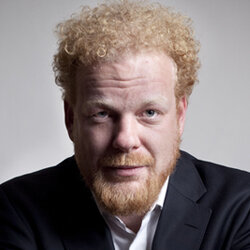A More Humane Economics
“Growth is good. Like a sunny day. But having an economy that assumes all sunny days is a recipe for disaster.”
This is one of the central insights from this week's podcast, featuring our very special guest, Tomas Sedlacek.
Strong Towns president Chuck Marohn has described Sedlacek, a celebrated Czech economist and the author of The Economics of Good and Evil, as one of the greatest influences on his thinking.
In this week's episode of the Strong Towns podcast, Marohn and Sedlacek dive deep into our economic system, which venerates the "cruel deity" of "the god of growth." Growth capitalism, as Sedlacek describes it, esteems growth above all else—even over values like democracy, stability and neighborliness. In such a system, the previously unthinkable either subtly or suddenly becomes credible.
We see the fruits of our economic system not just on our spreadsheets but in our built and social environments. In fact, says Sedlacek, our spreadsheets may be obstructing our view of the truth, which is that the economy, like almost everything in nature, goes in cycles. "I'm not against growth," he says. "I'm just against expecting that every year will be a growing year."
Economics, he says, is too human to be studied as a hard science, like chemistry or physics. We should approach it like we would psychology, sociology and philosophy. Appropriately then, Chuck's conversation with Sedlacek ranges from discussions about the 2008 financial crisis and modern monetary theory, to a story from the Hebrew Bible, the etymology of the word "credit" (from the Latin credere, meaning "belief"), and Aristotle’s take on interest rates. Sedlacek also talks about what a society could look like it if it didn't have, at its center, unrealistic expectations of ceaseless growth.
And while you’re here, check out the five-part series we wrote on Sedlacek’s book, The Economics of Good and Evil.
Understanding Growth, Part 1
We've traded stability for growth, but now we find that we have neither.
My hometown of Brainerd, MN, is millions of dollars in debt. We're one of the poorest cities in the state and are perpetually among the highest in unemployment. More of our budget comes from aid from the state than we raise locally through property taxes. We have untold obligations we cannot meet, from building repairs to road maintenance, and we've laid off our fire fighters and many of our police officers. Yet, despite our fragile and nearly desperate financial state, we are about to borrow another $10.7 million for a sewer and water expansion project we don't really need. Why would we do such a thing? The one word answer: growth... Read the rest of part 1.
UNDERSTANDING GROWTH, PART 2
On the seventh day, God rested, not because He needed to be back at the office Monday morning to create another universe... God rested because God was done.
There is a tragic paradox to the women’s movements of the past century, specifically when it comes to women in the workplace. What started out as liberation – the choice of whether or not to work and to have that labor valued and respected in the same way as a man – has evolved into something else. Today most women do not have a choice as to whether or not they work. Work is an economic necessity. In a theoretical sense, women entering the workplace should have meant a number of positive things at the family level of finance... Read the rest of part 2.
Understanding Growth, Part 3
We created debt to serve us. Now we serve debt.
Common consensus among our intellectual class is that debt doesn't matter. Perhaps more precisely: concerns over debt are less important than concerns over growth. Paul Krugman, the living caricature of this mindset, writing in his book End This Depression Now, made the following argument in the introduction... Read the rest of part 3.
Understanding Growth, Part 4
Are we a society of villains or of neighbors?
Adam Smith is most well known today for The Wealth of Nations and, in that book, his single (perhaps offhanded) mention of the Invisible Hand is the most famous passage. To say we have literally built our entire growth economy around this notion -- that a market where everyone works in their own selfish, self interest will magically produce optimum outcomes for society -- would not be an overstatement.... Read the rest of part 4.
Understanding Growth, Part 5
Can we only satisfy our needs by increasing our neediness?
In a rain forest, you have a complex, adaptive system that has emerged in a way that is, as a byproduct of how it emerged, highly resilient and adaptable. The corn field, in contrast, is a system based on efficiency, constantly increasing the amount of output for a given unit of input. One hail storm, a few weeks of drought or a swarm of locusts and it's gone. We might think we prefer the human equivalent of the rain forest, but do we? Read the rest of part 5.






